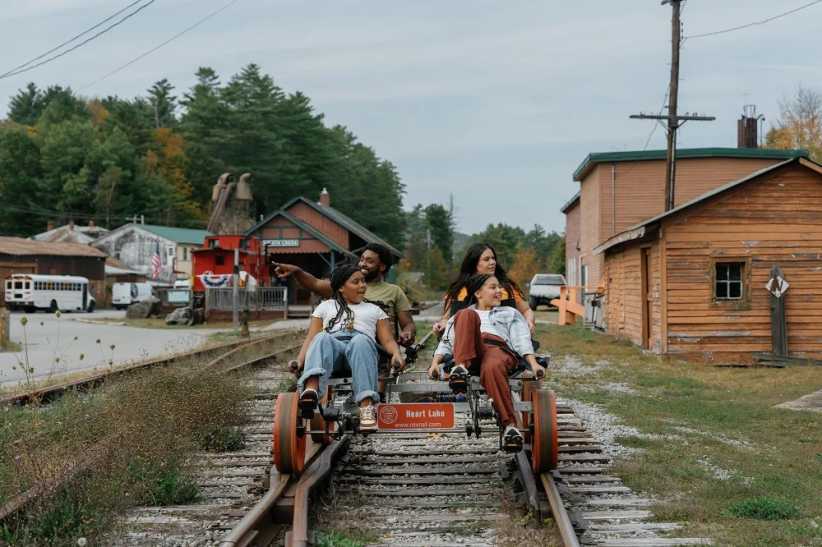My family always enjoyed planning our annual summer vacation together. As our kids got older, our getaways needed to include their favorite summer activity — at least one day at a nearby water park. We would scout locations to be sure there was a park in the general vicinity, guaranteeing a day of unbridled splashing, tubing, and sliding. We have probably visited 15 over the years.
We found that there was always something for all of us to enjoy. I favored the lazy rivers, wave pools, and family tube rides. My husband and kids were more adventurous — enjoying free-fall type slides and water coasters.
Nothing beats the summer heat like a day full of wet and wild fun; however, as with most activities in and around water, there are safety precautions parents should take to ensure a healthy day at the water park.
Read park guidelines prior to visit
It’s imperative to read the park’s guidelines before you go. Information about picnic areas, swim diapers, first aid, electrical storm shelters, and other policies can usually be found on the park’s website. If you have a question that is not answered in the guidelines, call ahead.
Wayne L. Franks, Jr., director of operations for Camelbeach Mountain Waterpark in Pennsylvania, says, “Camelbeach provides life jackets for free, which are available for all non-swimming guests. For our Kahuna Lagoon Wavepool, all guests under 48 inches in height are required to wear a life jacket and have a responsible chaperone within an arm’s length of them at all times.”
Foam toys or air-filled arm rings are not substitutes for U.S. Coast Guard-approved life jackets, and are usually not allowed at water parks.
There will be rules about attire as well.
“Footwear is encouraged for all guests while traveling from one attraction to the next,” says Franks. “However, most footwear is restricted from being worn while riding, with the exception of aqua-socks or water shoes. There is a shoe and garment rack available at all slides and attractions for guests to deposit their personal belongings while enjoying the ride,” he adds.
Check restrictions on loose-fitting garments. Certain attractions may require swim shirts (fitted, flexible tees made for swimming) or bathing suit only (e.g. at Camelbeach, shirts are not allowed on the Vortex slide). Metal zippers and other adornments may not be permitted as well, so read the rules carefully.
Swim diapers are required for children who are not potty trained.
“Swim diapers must be worn by all guests who are not 100-percent potty trained. Swim diapers are available at our water park retail store,” says Franks. Some water parks will not have swim diapers available for purchase, so parents need to come prepared with extras.
Requirements vary from park to park regarding unsupervised minors and age minimums for “supervisors.” Remember, too, that lifeguards are there to protect guests from drowning or other attraction emergencies, not to supervise children.
Parents should also locate the first-aid office as soon as they enter the park.
Prevent bacterial infections
Some water parks have rides that utilize both chlorinated pools and adjacent fresh water areas (e.g. a lake). Swimmers need to take precautions while swimming in both fresh water and chlorinated pools.
“Bacteria and pathogenic amoebae are present in freshwater lakes and ponds and in improperly chlorinated swimming pools,” explains Francine Marciano-Cabral, professor of microbiology and immunology at Virginia Commonwealth University. “In warm weather, pathogenic bacteria and amoebae divide rapidly in fresh water.”
Marciano-Cabral discusses ways to prevent bacterial and amoebic infections.
“When freshwater lakes or ponds appear cloudy, it is best to avoid swimming there. When swimming in lakes and ponds, do not stir up the bottom. It is also important to keep the head above water as many pathogens can enter the nasal passages, or contaminated water can be swallowed. Use nose clips if children go to a water park where the water shoots up out of the ground.”
Chlorinated water may contain bacteria.
“The problem with chlorinated pools is that in the hot weather, with the sun shining, the chlorine dissipates and the levels fall rapidly. So it is important that chlorine levels are checked frequently,” Marciano-Cabral says. “Shoes are important to wear to prevent fungal infections to feet.”
“To help limit the spread of infection, you should stay out of the water if you have diarrhea or open wounds,” advises Dr. Melissa Winterhalter, a physician with the section of ambulatory pediatrics at Nationwide Children’s Hospital in Ohio. “Showering, even a quick, one-minute rinse before and after swimming, can help to decrease pathogens,” she adds.
Winterhalter recommends that parents change their babies and toddlers frequently, even if wearing swim diapers.
“Most swim diapers are made to hold the stool or urine output, but they will leak after extended time. Check the diaper often to be sure it doesn’t need to be changed — every 30 to 60 minutes helps prevent urine or stool leakage,” she says. “Changing should be done in the bathroom or in a diaper changing station, not poolside.”
Swim safety tips
According to the Centers for Disease Control and Prevention, “Drowning is a leading cause of unintentional injury or death among children 1–14 years old. Swimmers can prevent drowning by learning swimming skills such as floating, by wearing life vests, and by swimming under the supervision of parents, caregivers, or lifeguards who know cardiopulmonary resuscitation (CPR).”
“Always swim with a buddy and where there is a qualified lifeguard on duty,” advises Franks.
Everyone should follow all posted height and weight restrictions and should follow the lifeguard’s specific instructions when riding the slides, tubes, and other attractions.
Parents should never leave a non-swimmer unattended, even if a lifeguard is nearby.
Hydration
When you’re frolicking in the water, it doesn’t always feel like you need to drink water.
“Most children don’t drink enough when they are at a water park or enjoying outdoor play,” warns Winterhalter. “As a guideline, try to take a break every hour in the shade to drink, rest, and re-apply sunscreen. Younger children may need more frequent breaks. If your child goes to the potty and their urine is dark or strong smelling, they need to focus on drinking more than usual and may need a longer rest.”
Sun safety
The Centers for Disease Control and Prevention reports, “Sunburn is not immediately apparent. Symptoms usually start about four hours after sun exposure, worsen in 24–36 hours, and resolve in three to five days.”
Therefore, parents should regularly apply sunscreen, because burns may not be easily detected.
“Everyone should apply sunscreen of SPF 30 or greater any time they are outdoors and exposed to the potentially harmful rays of the sun,” Franks says. “Be sure not to forget your face, tips of the ears, and tops of your feet, as these are tender areas often forgotten and susceptible to severe sunburn.”
Of course, if you notice a sunburn developing, it is best to seek shade, drink water, and apply after-sun lotion to rehydrate the skin (e.g. one containing aloe).
Security and emergencies
Family members getting lost or separated is always a concern at any amusement park.
“At Camelbeach, we encourage all families and groups to have a pre-established plan for a meeting place if any one of their party happens to become separated,” says Franks.
Water parks have security teams trained to help reunite family members, so parents should point out staff uniforms, so their children can locate an employee or security personnel if they get lost or frightened.
John Poncy, a security expert and chief executive and quality officer of The Densus Group, suggests that parents teach their family members a five-point contingency plan that Poncy learned in the military. This can be modified for any amusement park or other crowded venue so that family members know what to do in case of separation or emergency:
G – Where leader is Going: Know which part of the park Mom, Dad, or an adult supervisor will be at any particular time
O – Others leader has with him or her: Who is with Mom in the toddler area?
T – Time leader will be gone: Know what time Dad plans to return to the wave pool or other specified meeting place.
W – What to do if the leader does not return on time: If Mom doesn’t return by 4 pm, go to the Security Office and wait for her there.
A – Actions in an emergency if leader is not present: If there is an emergency at your location (such as violent weather), wait for authorities or security personnel to give you instructions.
Poncy also reminds parents to help their children memorize phone numbers.
“Make them memorize your phone number, because if their phone dies and they need to use someone else’s phone, they will need to know the number to call.”
Myrna Beth Haskell is an award-winning author. She is also cofounder and managing editor of SANCTUARY (www.sanct
Safety first
Parents may find additional safety information at the following websites:
• International Association of Amusement Parks and Attractions: http://www.iaapa.org/safety-and-advocacy/safety/water-park-safety/tips
• Healthy swimming tips: https://www.cdc.gov/features/healthyswimming/index.html
• The model aquatic health code: An all-inclusive model public swimming pool and spa code: https://www.cdc.gov/mahc/
Water park essentials pack list:
Pack the following items the night before you plan a trip to a water park to be sure you have the right supplies on hand:
• Sunscreen for body and face
• Hats and extra T-shirts (or water tees)
• Sandals or water shoes with treaded or rubber soles to prevent slippage
• Sunglasses with strap
• EpiPen if needed
• Band-Aids, anti-bacterial ointment
• Waterproof watch and camera
• Extra swim diapers
• U.S. Coast Guard-approved swim vest for non-swimmers, unless provided by park























